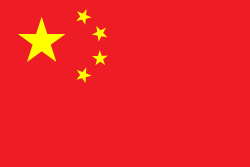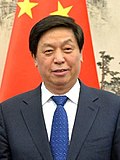Top Qs
Timeline
Chat
Perspective
Chairman of the Standing Committee of the National People's Congress
High constitutional office of China From Wikipedia, the free encyclopedia
Remove ads
The chairman of the Standing Committee of the National People's Congress is the presiding officer of the Standing Committee of the National People's Congress (NPCSC), which is the permanent body of the National People's Congress (NPC), the national legislature of China.
Remove ads
The chairman is formally nominated by the Presidium of the NPC during a session and approved by the delegations of the NPC, though in reality is chosen within the ruling Chinese Communist Party (CCP).[2] The chairman presides over the work of the NPCSC and convenes and presides over its meetings. The chairman is assisted by the vice chairpersons and secretary-general of the NPCSC, who together makeup the Council of Chairpersons.[3] A vice chairperson may be delegated to exercise some of the chairman's powers by the chairman. In the case that the chairman becomes incapacitated, NPCSC temporarily elects one of the vice chairpersons until the chairman is able to resume their work or a new chairman is elected by the NPC.[4][non-primary source needed] The position holds reserve constitutional powers under the 1982 revision of the Constitution of the People's Republic of China. As stipulated in Article 84 of the Constitution, should both the president and vice president become incapacitated, and the National People's Congress is unable to elect a timely replacement, the chairman of the NPCSC will act as president.[4][non-primary source needed] The chairman leads the Leading Party Members Group of the NPCSC, which is responsible for the implementation of CCP Central Committee policies in the NPCSC.[5]
From 1998 to 2013, the position was ranked second in the hierarchy of the Politburo Standing Committee of the CCP, since Li Peng was barred from seeking a third term as premier in 1998. In the political order of precedence, the chairman ranks below the CCP general secretary (paramount leader) and president (state representative).[6] The ranking of this position is not necessarily reflective of its actual power, which varies depending on the officeholder. The incumbent chairman is Zhao Leji, who is the third-ranking member of the Politburo Standing Committee.
Remove ads
History
Summarize
Perspective
During the drafting of the PRC constitution, there were debates on which title to use for the head of the NPC Standing Committee. On 23 March 1954, at the first meeting of the Constitution Drafting Committee, the Central Committee of the CCP put forward a draft that used the title "speaker" (议长). During the draft discussion, there were various discussions on whether to use "speaker" or "chairman" (委员长) for the title of the post. Those who used the "chairman" title argued that it would be unpopular as Chiang Kai-shek also used that title, while those supporting it saw no issue. There were also ones proposing the use of "chairman" (主席), similar to the chairman of the Presidium of the Supreme Soviet, but others argued against this by saying the title was the same as the chairman of the People's Republic of China, meaning that the masses could easily confuse them.[7]
During the discussion Tian Jiaying, the deputy secretary-general of the Constitution Drafting Committee, said that the NPC is an organ of power rather than just a deliberative organ, and that the "speaker" title is not commensurate with its nature. Eventually, the word "chairman" (委员长) was adopted. The office came into existence with the adoption of the 1954 Constitution, with Liu Shaoqi becoming its first holder.[7]
From 1975 to 1983, the chairman of the Standing Committee served as state representative of the People's Republic of China, as the presidency had been written out of the 1975 constitution and was also excluded from the 1978 draft; the presidency was restored in 1982.[8] Theoretically, during the 1989 Tiananmen Square protests, the officeholder at the time, Wan Li, had the power to call an emergency session of the NPC to resolve the issue constitutionally. However, Wan's freedom of movement was restricted, and ultimately rendered powerless in the situation.[9]
Between 1993 and 1998, the office was held by Qiao Shi, who was the third-ranking member of the Politburo Standing Committee. Qiao tried to get rid off the NPC's "rubber stamp" reputation and turn it into an institution with real power in establishing the rule of law.[10] On 16 March 1998, Li Peng was elected the chairman of the NPCSC, replacing Qiao Shi. However, he was elected with less than 90% of the vote, with around three hundred delegates not backing him, despite the fact that he was the only candidate.[11]
Remove ads
List of chairpersons
Multiple terms in office, consecutive or otherwise, are listed in the Term column.
- Mao Zedong Administration
- Deng Xiaoping Administration
- Jiang Zemin Administration
- Hu Jintao Administration
- Xi Jinping Administration
Timeline

Remove ads
Notes
- During this vacancy Soong Ching-ling performed the functions and duties of the chairperson as the first vice chairperson.
Further reading
- Truex, Rory (2016). Making Autocracy Work: Representation and Responsiveness in Modern China. Cambridge University Press. ISBN 9781107172432.
- Mackerras, Colin; McMillen, Donald; Watson, Andrew (2001). Dictionary of the Politics of the People's Republic of China. Routledge. ISBN 978-0415250672.
References
Wikiwand - on
Seamless Wikipedia browsing. On steroids.
Remove ads












